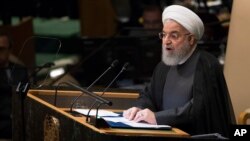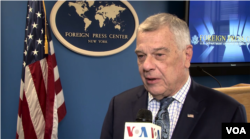The Trump administration is drawing more attention to concerns about human rights in Iran as part of its campaign to pressure Tehran into a new deal regarding its perceived malign activities.
Senior State Department officials highlighted those concerns in a Friday news briefing devoted to Iran’s human rights record on the sidelines of the U.N. General Assembly in New York.
Human rights record
In response to a VOA Persian question about how much importance the Trump administration attaches to Iran’s human rights record versus its other activities, U.S. Special Representative for Iran Brian Hook said alleged Iranian rights abuses are on a par with what he called other “destructive” Iranian threats such as missile proliferation and damage to the national environment.
“We don’t believe in taking these things seriatim [tacking one subject after another in regular order],” Hook said. “We think you need to take a comprehensive approach and highlight the entire range of Iran’s destructive behaviors.”
The State Department reviewed those behaviors in a report published Tuesday, titled Outlaw Regime: A Chronicle of Iran’s Destructive Activities. It is the first report produced by the department’s Iran Action Group, created last month and led by Hook.
Iranian President Hassan Rouhani, visiting New York for the U.N. General Assembly, did not directly address U.S. criticisms about his country’s human rights record in a Wednesday news conference near the U.N. headquarters. But he did call on the United States to stop what he called its “bullying” and “pressuring” of Tehran.
Continuing his response to VOA Persian’s question, Hook said addressing alleged Iranian human rights abuses is among 12 demands made of Iran by Secretary of State Mike Pompeo. In a May speech, the top U.S. diplomat listed them as conditions for a new deal that President Donald Trump wants to negotiate with Iran, days after Trump withdrew from a 2015 nuclear agreement between Iran, his predecessor and five other world powers.
The fifth demand in Pompeo’s list says: “Iran must release all U.S. citizens, as well as citizens of our partners and allies, each of them detained on spurious charges.”
“Pompeo (talked) about releasing all U.S. citizens who are detained unjustly, and also those detained from our allies and partners around the world, because their human rights are violated,” Hook said.
The list of U.S. demands does not include a call for Iran to release all of the hundreds of political prisoners that Washington says are held in the country. But, in an interview with VOA Persian after the briefing, Ambassador Michael Kozak of the U.S. Bureau of Democracy, Human Rights, and Labor said Washington would welcome such a step.
“Any solution to this problem is going to involve releasing the political prisoners,” Kozak said. “This is not a major demand. It is pretty much what we would demand of any country (to) live up to its obligations under the U.N. charter and international human rights law. And it would be a good sign on (the Iranians’) part that they are serious about changing their behaviors.”
This article originated in VOA’s Persian Service.






